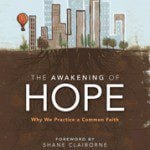Despite the fact that we experience so little of it—indeed, precisely because we lack this basic human need—community is “in” these days.
 Marketing firms know that community sells. They don’t tell us how carbonated sugar water will help us or even how good it tastes. They show us pictures of people enjoying life together while holding cans of the drink they want us to buy. But we know that community is more than a soda shared with friends. We still haven’t found what we’re looking for.
Marketing firms know that community sells. They don’t tell us how carbonated sugar water will help us or even how good it tastes. They show us pictures of people enjoying life together while holding cans of the drink they want us to buy. But we know that community is more than a soda shared with friends. We still haven’t found what we’re looking for.
At the heart of Saint Benedict’s wisdom is an understanding that the call of the gospel is a call to community. But it is a call that challenges our contemporary hunger for community. While a desire for real relationship with God and other people may bring us to monastic wisdom, the wisdom itself pushes back, suggesting that our longings are not enough. Benedict knows that a simple desire for community will not create healthy community. In fact, our hopes and dreams about community may be our greatest obstacle to true fellowship with others.
In his introduction to the “kinds of monastics,” Benedict doesn’t mince words about our confused desire for community. Here’s an excerpt from my The Rule of Saint Benedict: A Contemporary Paraphrase:
There are the idealists who live in communities, neither listening to the wisdom of their sisters and brothers nor submitting to a rule that could purify them as gold is purified by fire (Proverbs 27:21). They are the worst kind, really. Their character is as soft as lead. Everything they do is driven by their own desires, so they lie to God when they call themselves “Christian communities.” Two or three share a house together—or are even scattered about, not under the same roof—and their utopian experiments are their own projects, not the Lord’s. The rule they follow is their own desires; they do whatever they like. If they believe something or choose it for themselves, that’s their “rule”; if there’s anything they don’t like, they reject it as evil.
Finally, there are the spiritual consumers who wander around from one place to another, visiting a community here, a conference there, always looking for the next best thing. They’re always on the go, never settling down because they’ve become captive to their own desires and big ideas about what a life with God should look like. To tell the truth, they’re worse than the hypocrites living in communities.
Benedict knows that we need a better way forward. Community can’t be based on our own best ideals. It can’t be reduced to seven easy steps. God is not a means by which we can achieve our ideals; other people don’t want to be a means either.
The key to community, Benedict sees, is learning to submit our own desires to the reality of others’ needs and to God’s direction for what life should look like. This is why, from the very beginning of the Rule, listening is the essential work. This way of life is shaped around learning to listen to God and to other people. “Listen, my child,” the Rule begins. And it keeps whispering the same wisdom to us, again and again.
Who are you listening to in the place where you are? What are you hearing?











